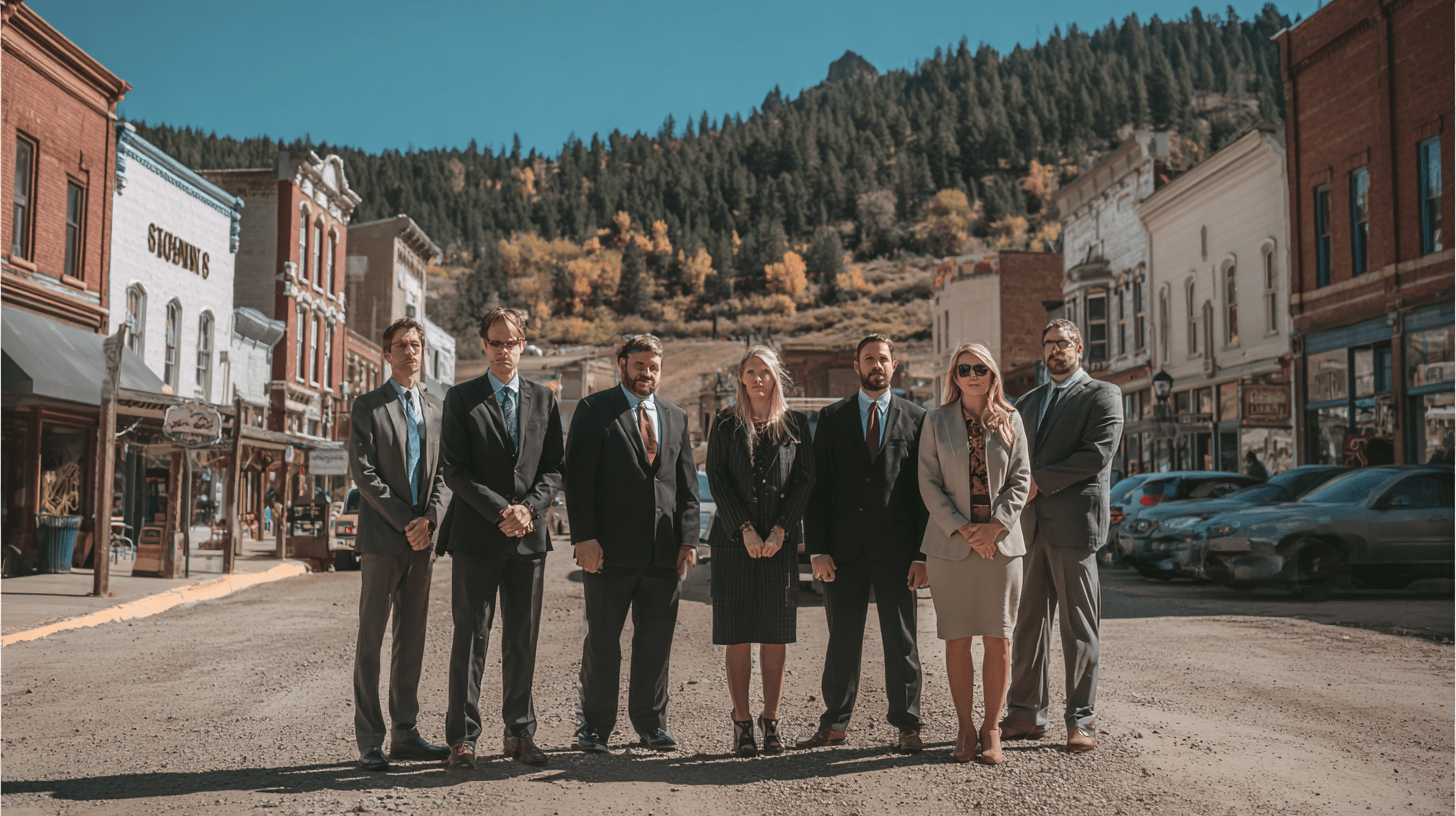It’s important that you take control of your estate planning to protect your assets and loved ones in Deadwood. Understanding local laws and regulations helps you avoid costly mistakes. This guide highlights key steps, including wills, trusts, and power of attorney, making it easier for you to secure your future and provide peace of mind. Let’s explore Estate Planning in Deadwood!
Why Is Estate Planning So Important in Deadwood?
Estate planning in a close-knit community like Deadwood requires local insight and legal expertise. At Tyler Sampson Jacobs Partners, we help individuals and families create clear, effective plans that protect what matters most. Contact us or visit our website to speak with an estate planning attorney today.
Please note: This post is designed for educational purposes and IOG does not provide legal services.
Key Takeaways:
- Estate planning in Deadwood requires understanding South Dakota’s unique laws and regulations.
- Wills and trusts are primary tools for managing and transferring assets effectively.
- Choosing the right executor or trustee can impact how smoothly your estate is handled.
- Power of attorney documents help manage your affairs if you become incapacitated.
- Local attorneys offer specialized knowledge tailored to Deadwood’s estate planning challenges.
- Avoid common mistakes like failing to update documents after major life changes.
- Community resources in Deadwood provide support and guidance throughout the estate planning process.
Essential Components of Estate Planning in Deadwood
Your estate plan in Deadwood will typically include a will, trusts, power of attorney, healthcare directives, and beneficiary designations. Each element serves a unique function guided by South Dakota law, ensuring your assets transfer smoothly and your wishes are respected. Knowing how these parts interact helps you avoid probate complications and protects your family’s future.
The Critical Role of Wills in South Dakota
A South Dakota will directs how your property distributes after death, names guardians for minor children, and can appoint executors to manage your estate. Without a valid will, state intestacy laws decide heirs, which may not align with your desires. Wills must comply with South Dakota’s signing and witness rules to remain enforceable.
Safeguarding Wealth: The Power of Trusts
Trusts control your assets during and after life, allowing you to bypass probate and provide structured distributions. South Dakota’s favorable trust laws, including no state income tax on trust income, make it an ideal place to establish both revocable and irrevocable trusts to protect your wealth from unnecessary taxes and legal challenges.
Expanding on trusts, South Dakota permits dynasty trusts that can last for multiple generations, preserving assets beyond your lifetime. You can tailor trust terms to benefit specific family members or charities under strict conditions. This flexibility lets you limit creditors’ claims and control asset use over decades, a powerful tool for long-term planning.
Planning for the Unexpected: Power of Attorney and Healthcare Directives
Granting power of attorney in Deadwood lets trusted individuals handle your finances and legal matters if you become incapacitated. Healthcare directives provide instructions for medical care, ensuring your treatment preferences are honored. These documents prevent court-appointed guardianships, streamlining decisions when you cannot communicate.
South Dakota law supports both durable financial powers of attorney and healthcare proxies, which remain valid even if you lose capacity. You can specify when and how they take effect, providing peace of mind. Local attorneys can draft documents customized to your needs, reflecting your family’s unique medical and financial situation.
Navigating Beneficiary Designations in South Dakota
Assets like life insurance, retirement accounts, and payable-on-death bank accounts use beneficiary designations that override your will. Keeping these designations updated in line with your estate plan ensures smooth, uncontested transfers. Misaligned beneficiaries can cause costly delays and family disputes here in South Dakota.
Because South Dakota respects these designations independently, you must regularly review and adjust them after life events such as marriage, divorce, or births. Integrating beneficiary choices with your overall plan prevents assets from unintentionally passing to former spouses or the state in the absence of heirs.

Local Legal Implications for Estate Planning
Navigating estate planning in Deadwood requires a clear understanding of South Dakota’s unique legal landscape. State-specific rules impact how your assets transfer, who qualifies to manage your estate, and the timelines involved in probate. Working closely with a local attorney helps you structure your will, trusts, and powers of attorney to meet South Dakota’s statutory requirements and avoid costly delays or disputes.
Decoding the South Dakota Probate Process
South Dakota’s probate system involves submitting your will to the local court in the county where you lived. Probate typically lasts six months to a year, depending on estate complexity. The court supervises asset distribution, creditor claims, and executor duties. Deadwood’s courts encourage expedited processes for smaller estates below $100,000, making your planning more efficient.
Understanding Community Property Rules in the State
South Dakota is an equitable distribution state, not a community property jurisdiction. That means marital assets divide fairly but not necessarily equally during estate settlements. Your property acquired before marriage generally remains separate, while shared assets receive proportional division based on contribution and intent.
South Dakota’s equitable distribution applies during both divorces and estate settlements. Differentiating between separate and marital property can affect how your estate divides among heirs. If you acquired land before marriage or received an inheritance, those often remain your separate property. Defining ownership and documentation minimizes disputes and protects your wishes.
Estate Tax Considerations Unique to South Dakota
South Dakota imposes no state estate tax or inheritance tax, which preserves more wealth for your beneficiaries compared to states with high tax burdens. This makes South Dakota particularly attractive for estate planning, especially for larger estates.
While South Dakota has no estate or inheritance tax, federal estate tax thresholds still apply. Estates above $12.92 million in 2023 face federal taxation, so if your assets surpass this, federal planning becomes necessary. Leveraging South Dakota’s favorable tax environment can help optimize trust strategies and asset protection.
Ensuring Validity: Legal Requirements for Wills in Deadwood
Your will must be in writing, signed by you and witnessed by two competent individuals who do not stand to inherit. South Dakota permits holographic wills if entirely handwritten by you but advises formal execution to prevent contests. Proper witnessing and notarization improve your will’s legal strength.
Deadwood’s local courts emphasize strict adherence to will formalities. For example, your witnesses must observe your signature signing or acknowledge it afterward. Including a self-proving affidavit expedites probate by reducing witness testimony needs. Consulting a local attorney ensures your will meets all South Dakota statutory conditions for enforceability.
Selecting Your Executor or Trustee: What You Need to Know
Choosing the right executor or trustee shapes how smoothly your estate will be managed after you pass. You want someone familiar with Deadwood’s unique legal landscape and capable of handling complex financial and legal matters. A misstep here can delay distributions, create conflict, or even risk legal challenges. Consider reliability, financial savvy, and willingness to serve before finalizing your decision.
From wills and trusts to power of attorney and healthcare directives, estate planning is about more than just documents—it’s about peace of mind. Tyler Sampson Jacobs Partners provides tailored legal advice to help Deadwood residents plan with confidence. Contact us or visit our website to learn more.
Understanding the Executor’s Responsibilities
Your executor oversees probate, pays debts and taxes, manages estate assets, and distributes inheritances under South Dakota law. This role demands attention to detail and persistence throughout lengthy court procedures. Executors must file inventory reports with the county, maintain clear records, and comply with deadlines to avoid costly errors or legal action.
Traits of an Effective Trustee
Effective trustees in Deadwood show strong fiduciary responsibility, impartiality, and communication skills. They manage trust assets prudently, ensuring income and principal are used in line with your wishes. Trustees frequently handle ongoing duties, including tax filings and financial reporting, requiring consistency and transparency.
Beyond managing finances, a trustee must navigate local court requirements and understand beneficiary needs. For example, South Dakota’s favorable trust laws allow dynasty trusts that stretch over generations. An effective trustee balances these complex elements to maintain trust integrity, protect assets, and uphold your estate plan’s long-term goals.
Judicial Oversight: How South Dakota Courts Evaluate Executors
South Dakota courts assess executor actions by reviewing their adherence to statutory duties and acting in good faith. They examine documentation accuracy, timely estate settlement, and proper creditor payments. Courts also scrutinize conflicts of interest to safeguard estate beneficiaries against mismanagement.
Court oversight includes hearing beneficiary complaints and ensuring executors avoid self-dealing or negligence. South Dakota’s Unified Probate Code empowers judges to replace executors who fail in their duties promptly. This mechanism helps maintain estate integrity but may lengthen probate if executors are unprepared or inattentive.
Weighing the Options: Professional Executors vs. Family
Professional executors offer expertise, impartiality, and familiarity with local probate procedures, minimizing errors and disputes. Conversely, family members can provide personal knowledge of your affairs but may lack experience or objectivity, which sometimes leads to conflicts or delays.
Hiring a Deadwood attorney or trust company as executor often proves wise for intricate estates or when you foresee family discord. Many professionals charge fees based on estate size, which can offset costly probate mistakes. If choosing family, clear communication and defined roles help prevent misunderstandings during estate administration.

Avoiding Common Pitfalls in Estate Planning
Estate planning often trips up those who overlook key details like keeping documents updated or ignoring local requirements. South Dakota’s probate process and property laws differ from other states, so staying current with changes and consulting knowledgeable Deadwood attorneys can save you time, money, and conflict among heirs. Choosing the right executor who understands your wishes and the law reduces legal disputes and administration delays. Avoiding these pitfalls helps preserve your legacy and ensures your assets pass smoothly to your beneficiaries.
The Risks of Neglecting Regular Updates
Failing to update your estate plan can cause your wishes to become outdated or invalid. Life events like marriage, divorce, or new property acquisitions may no longer be reflected. Given Deadwood’s evolving local laws, frequent reviews with your attorney help ensure your plan meets current legal standards and accurately protects your assets and family.
The Consequences of Ignoring Local Laws and Taxes
South Dakota’s estate and inheritance tax laws offer advantages but require precise compliance. Ignoring these can lead to unexpected tax burdens or lengthy probate delays. Deadwood has specific rules about property transfers, including mineral rights and historic property considerations, which greatly impact your estate’s outcome if overlooked.
For example, Deadwood’s unique mining heritage means mineral rights held within estates may be subject to specialized regulations. Missing these nuances can force heirs into costly legal battles or unexpected taxes. South Dakota’s lack of state inheritance tax doesn’t eliminate federal tax exposure, so integrating local and federal rules in your plan is crucial to minimize financial risks.
Protecting Your Digital Legacy: Don’t Overlook Online Accounts
Your digital assets—from social media to online banking—require explicit instructions in your estate plan. Without access plans, these accounts may be lost or frozen indefinitely. Listing login information and assigning digital executors ensures your digital presence, including photos, emails, and finances, is maintained or properly closed after your passing.
Deadwood residents often overlook digital estate planning despite increasing online activity. Directives cover password management, data privacy, and digital asset transfer protocols. A digital executor can manage cryptocurrencies or online business accounts, preventing loss of valuable digital property and reducing stress on your beneficiaries during estate settlement.
The Dangers of a Poor Executor or Trustee Choice
Selecting an inexperienced or uninterested executor can stall the probate process and increase costs. Deadwood’s smaller legal community means trustees unfamiliar with local practices may mishandle estate administration, causing family conflicts and legal challenges. Choose someone trustworthy, organized, and knowledgeable about South Dakota’s estate procedures.
Case studies in Deadwood reveal how poor trustee choices led to disputes over asset distribution and prolonged court involvement. A qualified executor actively communicates with heirs and legal professionals, navigates state-specific regulations, and safeguards your estate from mismanagement. Your plan depends on picking this critical role wisely to ensure smooth and fair execution of your wishes.
Launching Your Estate Plan with Local Expertise
Starting your estate plan with a knowledgeable local attorney streamlines the process by addressing South Dakota’s unique probate laws and tax considerations. Working with someone familiar with Deadwood’s legal landscape ensures your wills, trusts, and powers of attorney align with state requirements. This local expertise helps you avoid costly mistakes, protect your assets effectively, and set up your estate plan for smooth administration within the community.
Finding the Right Estate Planning Attorney in Deadwood
Look for attorneys who specialize in estate planning and understand South Dakota’s specific statutes. Many Deadwood lawyers offer free initial consultations to evaluate your needs. Check for credentials, client reviews, and experience handling trusts and wills. Local Bar Association referrals and community recommendations often point to reliable attorneys well-versed in managing estates for residents in the Black Hills region.
Preparing for Your Initial Consultation
Gather detailed financial records, including bank statements, property deeds, investments, and outstanding debts. List family members and beneficiaries along with their contact info and any special circumstances like disabilities. Knowing your goals—whether minimizing taxes, avoiding probate, or appointing guardians—helps your attorney tailor the plan effectively. Be ready to discuss existing estate documents, if any.
Review your assets thoroughly before the meeting by organizing documents for real estate, retirement accounts, and personal property. You’ll want to provide your attorney with complete information to identify potential estate tax implications or issues with asset titling. Preparing beneficiaries’ details and your preferences ahead allows the meeting to focus sharply on strategy rather than gathering data.
Essential Questions to Address with Your Attorney
Ask about how South Dakota probate laws impact your estate, options for using trusts, and strategies to reduce estate taxes. Discuss who you should designate as executor or trustee, considering local residency requirements or expertise. Verify how powers of attorney and healthcare directives align with state rules for protecting your interests if you become incapacitated.
Delve into the timing of updating your estate plan after major life events like marriage, divorce, or acquiring significant assets. Explore scenarios where probate might be avoidable, and clarify any state-specific inheritance tax regulations. Your attorney can also guide you through appointing a local executor familiar with Deadwood legal processes to prevent administration delays.
Financial Considerations: Understanding Costs and Fees
Estate planning fees vary widely in Deadwood but typically range from $1,500 to $5,000 for a comprehensive package including wills, trusts, and powers of attorney. Transparent fee structures are common, with some attorneys offering flat rates while others charge hourly. Ask about additional costs for trust administration or probate services to avoid surprises.
Flat-fee arrangements often cover document preparation and initial consultations, while hourly rates around $150–$300 apply if complex issues arise. Clarify billing practices early and request an estimate based on your estate’s complexity. Cost-effective planning upfront can prevent significantly higher probate expenses down the line.

Expanding Your Knowledge: Resources for Estate Planning in Deadwood
Connecting with local resources can simplify your estate planning journey in Deadwood. From legal aid to financial advisors, a variety of services specialize in South Dakota’s estate laws. Workshops and online tools also offer practical assistance to ensure your plans are robust and compliant. Leveraging these resources will help you avoid common mistakes and secure your legacy effectively.
Accessing Legal Aid and Pro Bono Services
Deadwood residents on a tight budget can find support through nonprofit organizations offering legal aid and pro bono estate planning services. Groups like the South Dakota State Bar Association provide referrals for free or low-cost consultations, helping you draft necessary documents like wills or powers of attorney without the financial strain of private attorneys.
Engaging with Local Estate Planning Workshops
Regular workshops hosted by community centers and local law firms offer you hands-on learning about wills, trusts, and probate procedures. These sessions often include Q&A segments with estate planning experts familiar with Deadwood’s legal landscape, giving you tailored advice specific to your needs.
These workshops not only clarify complex estate laws but also present networking opportunities with professionals and peers who share your concerns. For example, the Deadwood Public Library partners with local attorneys annually to explain updates in state regulations. Attending these events sharpens your awareness of potential pitfalls and assists you in crafting a more resilient estate plan.
Working with Trusted Financial Advisors in Deadwood
Financial advisors in Deadwood frequently collaborate with estate attorneys to maximize tax efficiency and preserve assets within your estate plan. By working with a trusted advisor, you gain insight into how investment strategies, insurance policies, and retirement accounts can complement your wills and trusts.
Seasoned advisors analyze your portfolio to identify gaps or risky allocations that could jeopardize your estate’s value. They help you adjust plans in light of South Dakota’s estate tax exemptions and protections, ensuring your assets pass to beneficiaries smoothly while minimizing unnecessary fees or delays.
Harnessing Online Tools for Estate Management
Several digital platforms provide customizable templates and checklists aligned with South Dakota regulations, enabling you to draft basic wills and healthcare directives from home. These tools often include reminders and updates to keep your documents current.
Online estate planning websites like Nolo and Trust & Will offer options to integrate local legal requirements, facilitating a smoother probate process. Using them as a supplement alongside local attorney advice can increase your confidence in the robustness of your estate plan while saving time and money.
Final Words
To wrap up, estate planning in Deadwood, South Dakota, helps you protect your assets and ensure they pass to your loved ones smoothly. Understanding local laws and choosing the right legal tools empowers you to create a plan suited to your needs. Start early and seek guidance from a qualified local attorney to make your estate plan effective and secure.
If your estate plan is outdated—or if you haven’t started one yet—it’s time to take action. Let Tyler Sampson Jacobs Partners guide you through the process with trusted, local support. Contact us or visit our website to schedule your consultation.
FAQ
Q: What are the main estate planning documents needed in Deadwood?
A: The primary documents include a will, trust, and power of attorney. These help manage assets and healthcare decisions under South Dakota laws. Each serves a different purpose to ensure your estate is handled according to your wishes.
Q: How does South Dakota law affect estate taxes in Deadwood?
A: South Dakota does not impose a state estate tax. This means estates in Deadwood benefit from no state-level tax on asset transfers. However, federal estate taxes may still apply for larger estates, so planning is important.
Q: Can I appoint a non-resident as executor or trustee in Deadwood?
A: Yes, South Dakota allows non-residents to serve as executors or trustees. However, choosing someone familiar with local laws can simplify the estate administration process and reduce complications.
Q: What are common mistakes to avoid during estate planning in Deadwood?
A: Avoid not updating your documents regularly, failing to plan for incapacity, and neglecting to select a reliable executor. These oversights can cause delays and disputes during estate settlement.
Q: How do trusts benefit residents of Deadwood in estate planning?
A: Trusts can help avoid probate, provide privacy, and control asset distribution after death. They are flexible tools especially useful in South Dakota for managing family wealth and protecting beneficiaries.
Q: When should I consult a local attorney for estate planning in Deadwood?
A: It is best to consult early, especially after major life changes like marriage or having children. A local attorney ensures your plan complies with South Dakota laws and suits your unique situation.
Q: What community resources are available in Deadwood to assist with estate planning?
A: Deadwood offers resources such as legal aid clinics, senior centers, and workshops hosted by local bar associations. These provide guidance and connect residents with qualified estate planning professionals.

